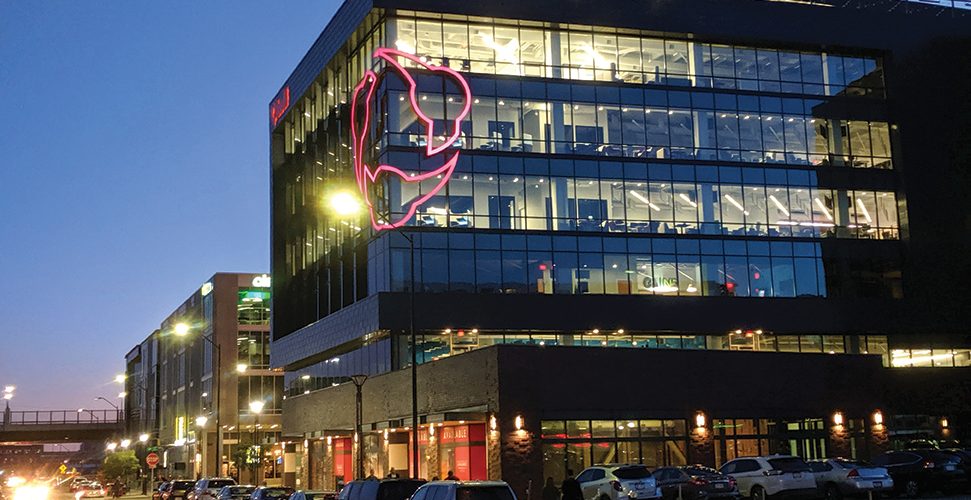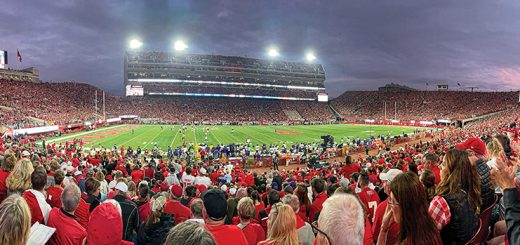Tech Entrepreneurs on the Prairie

by Julie Nichols
For decades, questions have swirled around why so few tech companies have taken root in rural states, and many pondered solutions to the “brain drain” of gifted and educated young Nebraskans leaving the state to seek more fertile career opportunities.
Now a central player on the Silicon Prairie, Lincoln’s startup companies and the incubator groups they’ve attracted continue to provide new services, jobs, and innovation to the economic sector of the plains. Through cooperation between university, government, corporate support, a thriving ecosystem in business development has become the norm.
With the development of University of Nebraska’s Innovation Campus and its accompanying workspaces, educational support for small companies and grant competitions came further interest in “keeping it local” by offering training, maker spaces, and routes to seed investors. Through extensive and intricate teamwork between city and state organizations, local consortiums of early-stage investors, and large local and national corporations, business development is continuing to thrive despite the economic uncertainties and wild swings in the economic health at both national and state levels.
With a focus in start-ups comes investment interest and venture capital flow into Lincoln. In general, Lincoln garners over $150 million in investments annually, and that amount seems to be growing. Via the nurturing of innovative ideas and support for entrepreneurship, initial investments, and a supportive environment of partnerships, prototyping funds and seed grants enable growth for many types of small industries. From trucking software to biometric cattle tags to surgical robots, these funds drive technology to new cutting-edge applications ready for widespread implementation. Virtual Incision, maker of less-invasive surgical mechanisms, Adjuvance Technologies, producer of a vaccine-improvement ingredient, are part of meaningful advances in medicine. Another local venture-funded company, Ocuvera, developed a predictive algorithm video system to prevent patients’ falls. The system has now been adapted for use in visual monitoring of COVID-19 patients in intensive care treatment rooms to reduce PPE use and further protect medical staff from exposure while still providing full patient care. Ocuvera is adding voice activation to its systems, currently in implementation phase, and working on other product adaptations to fight COVID-19.
One of Lincoln’s start-up success stories, Hudl, creator of sports training software now used for from high school to pro-level, exploded quickly into a multi-million dollar company, buying up most of its competitors. A startup from 1996, student-loan servicer Nelnet now serves nearly half a million students and its acquisition, Allo Communications, has provided a growing fiberoptic system now expanding to most Lincoln neighborhoods. Lightning speed internet has become a boon for those working at home during the pandemic. Both Hudl and Nelnet/Allo have transcended the definition of startup to become multi-million-dollar companies and major Lincoln employers. Nelnet has played its own role in reinvesting its capital in several local startups, including the now-mature Hudl.
But the variety and size of start-ups driven by NMotion Studios is a sign of a kind of paradigm shift in how business models themselves continue to diversify. Joined by an incubator company, gener8tor, in an expanded partnership, NMotion Accelerator Studio launched in fall 2020 and continues its gBETA Lincoln pre-accelerator program (originally branded as gBETA NMotion in 2019) that provides seven weeks of free training to Nebraska-based entrepreneurs looking to develop products and business models before launching a startup. Fifteen hopeful startups, five in agriculture tech and another ten cohorts with no specific industry focus, participated in 2019. With no requirement of equity and no fees, this program will continue to run as NMotion and gener8tor to incubate new adaptive business concepts and product design.
The new merger of startup incubators/accelerators will focus on selecting both entrepreneurial talent and potential, including those transitioning from other careers, recent college graduates, and those with deep domain expertise. Special attention is paid to applicants who are not coming from established businesses. Selected individuals or teams receive $100,000 in local investment capital and in 16 weeks will design/build products, develop new services, or launch a company under the guidance of the NMotion Studios/gener8tor staff. Flexibility in the program allows devising self-generated product/service concepts, working with corporate partners in collaboration, or teaming with an NMotion investor to address a need relevant to their business.
Gener8ator, with a presence in several states and already proven success in Wisconsin, believes the Accelerator Studio model is an excellent development tool that brings forth all shapes and sizes of businesses and products, and creates a foundation for a self-sustaining economic ecosystem, and works particularly well for college towns that provide a spectrum of ideas and industries. As companies continue to bloom and grow, they retain talent and are able to reinvest in new ideas and harmonious additions to the local economy.
In addition to the growth in new start-ups, Lincoln also has a company dedicated to supporting success for fledgling businesses. Don’t Panic Labs, a spin-off of a young investment firm, Nebraska Global, develops software to aid growing businesses and to help them create customized software and software products on their own. Begun a decade ago by two University of Nebraska graduates, Nebraska Global focused investments on retaining some of the brightest tech graduates and stemming the exodus of educated workers fleeing to other states that offered more career opportunities. Inadvertently, Nebraska Global and Don’t Panic became a hybrid answer and an innovative playbook to both building and supporting new tech in Nebraska.
While Don’t Panic Labs is not purely a startup, almost all of its clients are. Whether new ventures lack co-founders or need tools to manage technical projects, Don’t Panic has the ability and experience to provide support and education for companies as they seek to grow. Last year, Don’t Panic acquired Stone Fin Technology, a company working within government and healthcare sectors, and collaborates with developers in established companies on technical/software solutions.
Many of Don’t Panic Labs 32 employees are UNL graduates, and its founders readily admit that the company is more identified as product-development than investment at this point, but assert that Nebraska Global was intended as a hybrid project to foster an identity and business sub-culture that addressed new tech. Founders Zimmer and Durham feel as if the company has made significant inroads into both retaining and attracting talent to Lincoln’s economy, and they look forward to more hiring as Don’t Panic Labs enters its most successful year.
Lincoln’s array of public and collective investors, which include the Department of Economic Development, Lincoln Department for Economic Development, Invest Nebraska, the Lincoln Chamber Foundation, Lincoln Partnership for Economic Development, and Nebraska Angels all help drive new businesses and products. Other large local entities also chip in: Ameritas, Assurity, Union Bank and Trust, and the University of Nebraska. Currently, for every $1 in public funding, $7 originates in private investment. Nelnet has reinvested in viable new concerns, among them Drone Amplified and Epicrop. While injections of private sector investment may seem sufficient, some believe public funding needs to increase to sustain growth and additional monies should push into under-represented areas both rural and urban.
Healthy investment relationships drive the economic landscape, whether civic or private. “States reap what they sow,” says Tom Chapman, a veteran of several startups and now a consultant. “If you plant a lot of seed grants, you receive a lot of plants that grow into million-dollar investments. As a state, we should be dramatically increasing the amount of seed grant funding we provide to companies.” Still, local companies have not only overcome the initial challenges faced by startups, but succeed in attracting substantial venture capital funding. With Lincoln’s proven success in startup development and sustained growth, further increase in private investors is on the horizon.



Recent Comments